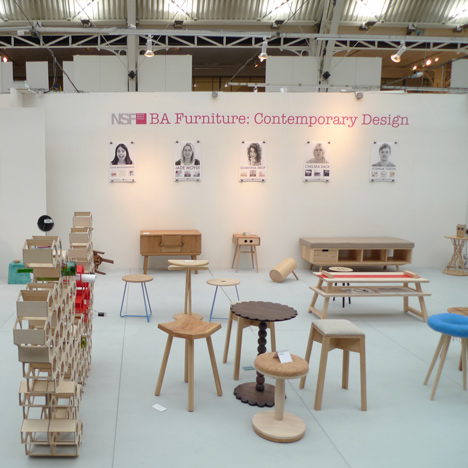Creativity "isn't welcome" in UK universities, says head of axed design course
News: universities "aren't interested in the type of education that is needed for creatives," says Neil Austin, head of the UK's leading furniture design course, which is being closed down.
Bucks New University in High Wycombe, northwest of London, announced last month it will cease recruitment for its renowned undergraduate programmes in furniture design and there will be no new intake for September 2014.
"This isn't just about getting rid of furniture courses, it's about making a statement that creativity isn't welcome within a university environment," Austin told Dezeen.
"If Bucks goes down, it's a big signal that universities themselves aren't interested in the type of education that is needed for creatives," he continued. "This is beyond furniture, this is about creative courses."
He believes the main problem is that the space and resources needed to teach subjects like design make them less financially attractive for universities than more academic subjects.
"Creative courses are a little bit messy and a little bit big - they need workshops, they need facilities and they need space to play," he explained. "Universities like sticking 100 students in a lecture theatre with one lecturer for an hour, two or three times a week. That's the business plan."
Rather than simply abandon courses that don't fit the neat business model universities have been forced to adopt, he suggests that academic institutions should balance the more lucrative courses against those that are more expensive to run in order to continue equipping graduates with skills required by industry, in particular the creative sector.
"Any good university has got to get the balance right between making the income and supporting courses that foster skills and intellectual pursuits which are needed in the country," he said. "If some of those other courses with one lecturer and 100 students are able to support the courses that make less money, then so be it."

Bucks New University cites the high costs of running the courses and declining numbers of applications as reasons for the decision.
"Competition for students has increased significantly in recent years and it has become necessary for universities to make changes in order to remain financially sustainable," said a statement from the university. "Our evaluation of courses took into consideration amongst other things the operational costs and investment required in delivering the programmes as well as declining student number trends over time."
Austin blames student numbers on a lack of targeted marketing. "Marketing at Bucks has no budget within the university - it's very poorly funded," he said. "But the bigger problem is that the people who do the marketing truly have no idea what the essence of advertising a creative course is about and so we're not reaching the right people. We get bundled in with the generic marketing programme that has absolutely no results for us."
Students, tutors and alumni are campaigning to keep BA furniture design courses at the university. Though the decision is unlikely to be reversed, by keeping discussion about furniture at Bucks open they hope it will be possible to create new undergraduate options in the future, to complement MA courses that are not affected.
"There is no doubt that since this announcement there is huge support outside the university for Furniture at Bucks, which is really heartening," said head of department Lynn Jones on the campaign's Facebook page. "Endorsements like these on Facebook give us a great marketing opportunity," she added. "I hope that in time we can turn this support into positive proposals for any potential future growth and new courses."
The BA Furniture course itself has only been running for two years, having formed from the merging of BA Contemporary Furniture and Product Design with BA Furniture Design and Craftsmanship. All current students will be allowed to complete their degrees but there are fears they could be affected by immediate cuts in staff and workspace.
The university is also closing BA Furniture Restoration, Conservation and Decorative Arts, BA 3D Contemporary Crafts and Products, and BA Fine Art, plus five engineering degrees.
Bucks is just one of many UK design schools under pressure from funding cuts, dwindling applicant numbers and increasing costs. Though record numbers of overseas students have applied to study architecture and design courses in the UK this year, the number of UK students seeking places on domestic architecture and design courses has been falling steadily since 2010.
Though MA courses in the country continue to thrive, closure of the UK's undergraduate courses fuels concerns raised last year that postgraduate institutions like the Royal College of Art could become "a Chinese finishing school", with intake limited to those who have already completed undergraduate education overseas.
However, recent changes to immigration law have fuelled concerns from prominent figures in the industry, who predict that visa restrictions could put off overseas talent as well.